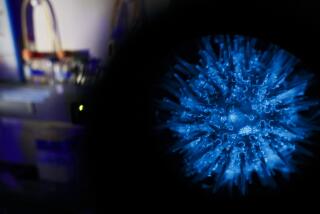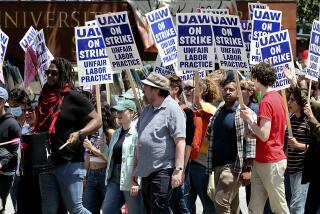Column: UC’s patent for its pioneering CRISPR discovery sets up a big battle over its rights
There certainly was reason for celebration at UC Berkeley on Feb. 8, when the U.S. patent office announced it would award UC a key patent for CRISPR, a groundbreaking technology for gene editing.
The announcement capped a nearly six-year journey through the patent thickets for the university and Jennifer Doudna, the Berkeley scientist generally credited as the main inventor of CRISPR. UC had filed its patent application on March 15, 2013.
Since then, the university had received two other CRISPR-related patents, but this one was all-encompassing, covering tools for editing DNA molecules “in any setting, both in vitro and within live cells … [and] across every cell type,” as UC stated in its press release.
All this racing to get patents is not really advancing the science or commercialization.
— Arti K. Rai, Duke University
But this is the patent world, and it involves an invention with potentially vast applications in agriculture, chemistry and medicine worth billions of dollars. As a result, UC’s fight to protect the rights it just won from the government is probably just beginning — with the outcome far from certain.
“This could paint a pretty big target on UC’s back, if they’re too aggressive in their licensing approach,” says Jacob Sherkow, a patent expert at New York Law School.
The patent issuance may intensify UC’s battle with the Broad Institute, a research foundation endowed by Los Angeles billionaire Eli Broad at Harvard and MIT that was awarded a CRISPR patent in 2017. UC challenged the Broad patent but lost last year in an appellate court ruling that turned on a patent technicality but didn’t address priority rights for either party. (We reported on that controversy in its early stages in 2016.)
The Broad’s patent is arguably subsumed by UC’s — but that’s one of many issues likely to become the subject of administrative proceedings at the patent office and even in litigation.
UC’s CRISPR patent also points to questions about whether such fundamental scientific discoveries should be patented at all. “It’s worth thinking about whether it makes sense … to have patent rights on CRISPR,” says Lisa Larrimore Ouellette of Stanford Law School, “given that this is a technology that was developed with public funding.”
That view is shared by academic researchers such as Berkeley biologist Michael Eisen, who wrote in his blog in 2016 that “neither Berkeley nor MIT should have patents on CRISPR, since it is a disservice to science and the public for academic scientists to ever claim intellectual property in their work.”
Patent gold rushes like the one unfolding around CRISPR are the product — some might say the unintended consequence — of the Bayh-Dole Act of 1980, which aimed to unlock the flow of federally funded scientific research into the marketplace by allowing researchers and their universities or businesses to commercialize their work, rather than leaving their rights in the government’s dead hand.
That made sense for research that might lead to, say, pharmaceutical breakthroughs, which can take years and millions of dollars to win regulatory approval. For more basic research such as this, it’s not as clear that patent rights are necessary.
“All this racing to get patents is not really advancing the science or commercialization,” says Arti K. Rai of Duke University. “But given that there is this racing, at least we can keep the patents narrow. It looks like the patent that just issued is not narrow at all.”
But whether the patent system has lubricated the transfer of technology from the laboratory to clinical use, rather than added layers of complexity, is another question. “These days, academic scientists also want to create their own companies,” Rai told me. “The game is not just academic recognition, but patents and start-ups.”
The most oft-cited model of judicious exploitation of a powerful patent is the so-called Cohen-Boyer patent, which launched the field of genetic engineering after it was issued in 1980 for the work of Stanley Cohen of Stanford and Herbert Boyer of UC San Francisco.
Stanford and UC decided against licensing exclusive rights to Genentech, which had been co-founded by Boyer. Instead, they licensed the technology “widely and nonexclusively on transparent, standard terms,” Rai wrote in a 2017 article in Science. Over the years, the patent is estimated to have given birth to products generating $35 billion in revenue, of which Stanford and UC collected an estimated $255 million.
But the breadth of the CRISPR patent could tempt UC into more aggressively defending its rights, hampering the future development of the technology.
It’s proper to observe that patent rights aren’t synonymous with academic or scientific credit. Berkeley’s Doudna is viewed by the scientific community as almost certain to win the Nobel Prize for CRISPR, probably with her research colleague Emmanuelle Charpentier, currently of Berlin’s Max Planck Institute for Infection Biology, and one other researcher. Views of her work’s scientific importance aren’t likely to be affected by any legal proceedings over the UC patent.
CRISPR isn’t the first technology to become the focus of a patent battle, and it won’t be the last. But it’s the most promising and potentially lucrative technology being fought over today.
As I’ve reported in the past, CRISPR — an acronym for the pattern in DNA strands that forms the basis of the technology — allows the cutting and splicing of DNA sequences with unprecedented precision and speed. CRISPR offers the possibility of splicing away genetic mutations that cause disability, making cells resistant to genetic disorders and creating plant strains immune to fungal diseases.
Doudna and most other leading scientists in the CRISPR field have founded firms to exploit CRISPR. In 2011, Doudna co-founded Caribou Biosciences with fellow researcher Rachel Haurwitz, who is currently its president and CEO; in 2013, Doudna and several other researchers — including Feng Zheng, whose work is at the core of the Broad’s patent — founded Editas Medicine; and in 2014, she co-founded Intellia Therapeutics.
Those firms hope to license CRISPR technology, in turn, to biotech firms. Editas, with which Doudna is no longer associated, is a surrogate for the Broad, and Caribou and Intellia are surrogates for UC. As it happens, Caribou and Intellia are engaged in their own intramural fight in arbitration over their respective UC license rights.
“Even in the world of CRISPR friends, there’s some fragging going on, with people shooting each other who should be on the same side of the fight,” Sherkow observes. “If you’re a patent litigator, this is the gift that keeps giving, unfortunately for the public.”
Among the issues expected to be aired in any future challenges of the UC patent is its breadth.
The Broad’s patent covers the use of CRISPR only in eukaryotic cells — that is, the cells of higher animals such as mammals, which have discernible nuclei unlike those of, say, bacteria. UC’s patent covers eukaryotic cells and everything else, including work in test tubes.
UC says that’s proper. “The patent system is meant to provide broad protection for inventors of important new foundational technology, and that’s what this is,” says Eldora L. Ellison, UC’s lead strategist on CRISPR patents. “So it’s appropriate that the claims granted to UC are fairly broad in their scope.”
Under patent office rules, almost anyone can challenge a patent on a wide variety of grounds. UC’s inclusive claims could draw challengers out of the woodwork — not merely biotech companies hoping to avoid infringement claims, but public interest groups and even individuals.
Ellison says that the patent may attract a larger than usual number of challengers, but that doesn’t mean they’ll be successful. “There’s nothing that stands out about the UC patent that should make it more vulnerable than any other patent to challenges from third parties,” she told me.
The leading concern for biotech companies hoping to commercialize CRISPR may be uncertainty about whether they should obtain a license from UC, the Broad, or both. That uncertainty could be eliminated if the two institutions simply made a deal to cross-license each other’s rights so that only one license was needed — indeed, the industry has been mystified about why that outcome hasn’t happened.
“We live in a dynamic world,” Ellison says. “Even though a deal hasn’t been reached as of yet, that doesn’t mean it never will be reached.” The Broad told me through a spokesperson, “We continue to believe that the best thing, for the entire field, is to reach a resolution with the University of California.” The institute says it has been open to a deal with UC “for more than six years,” including by joining patent pools, which license packages of patents in a given field en masse.
It’s conceivable, as Sherkow wrote in 2015, that it’s the patent “attorneys running this show — not the scientists.” That would be grounds for relief, since scientists traditionally want to disseminate their discoveries, and attorneys prefer to erect legal walls around them. Doudna has been deeply thoughtful about the implications of her work for humankind and science itself. But in a field with so much money at stake, whose preferences prevail?
Keep up to date with Michael Hiltzik. Follow @hiltzikm on Twitter, see his Facebook page, or email [email protected].
Return to Michael Hiltzik’s blog.
More to Read
Inside the business of entertainment
The Wide Shot brings you news, analysis and insights on everything from streaming wars to production — and what it all means for the future.
You may occasionally receive promotional content from the Los Angeles Times.











